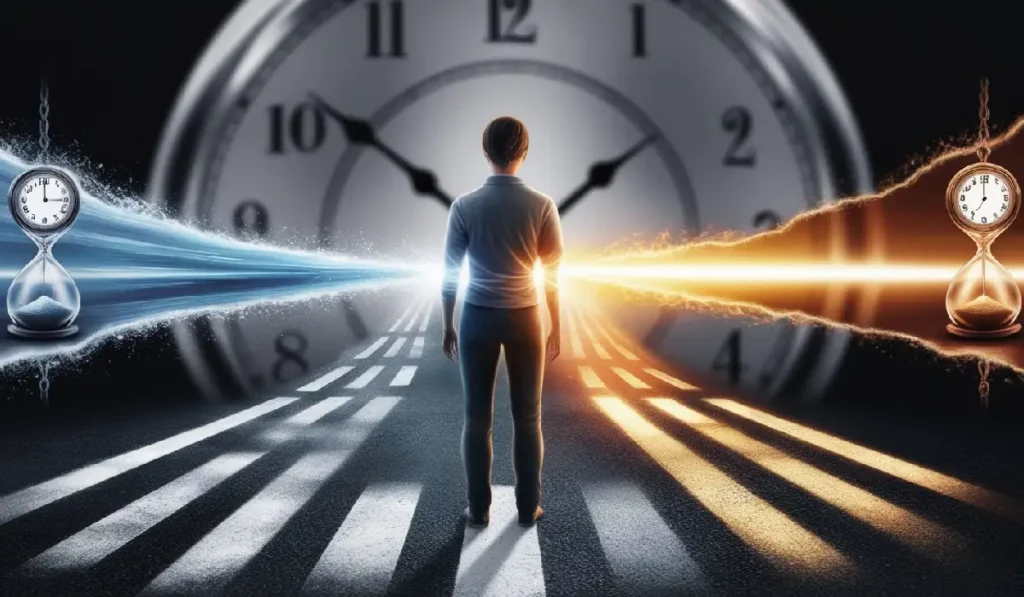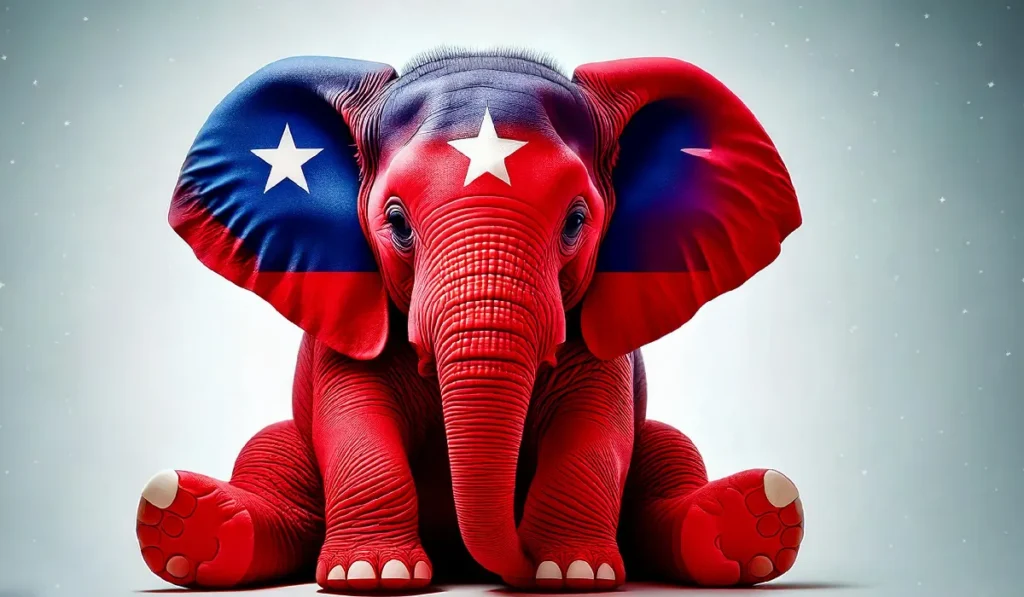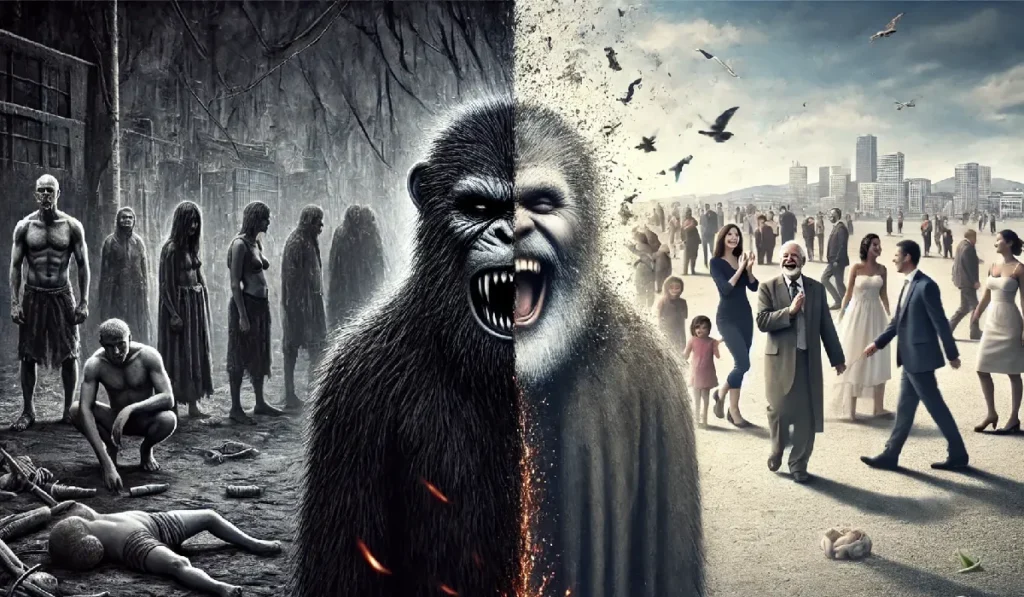
This individually shaped life story of every human being happens in time, which separates itself from the present in its constant flow and transforms this present into a past that can no longer be changed in every second, every minute, hour and every day.
The essence of time, then, is separation.
An unstoppable, constant separation from the present into an inaccessible past.
Apart from the constant and gliding flow of time, however, an additional, central separation process becomes essential for individual and social life and destiny and thus that of the world: the decision.
The word “decision” comes from Latin and means with de = ex and caedere = to cut, so in total to cut something off.
In the decision, such a possibility is brought out of the realm of dead possibilities, which the mind opens up in its thinking, into the realm of realization, so that one cuts oneself off from all other possibilities and has to separate oneself from the other possibilities.
No one can walk to the left and to the right at the same time at an intersection. Before his decision, both are possible, but he must separate himself from the dead possibilities of going straight, right or left. Life is realized in decision.
Decisions that can create an existential condensation from the previous life and its history and in which the dramas of this world are founded.
To fire and to have fired the fatal shot is an existential density in which perhaps a previous life in its history of hatred is summarized and, in the decision, made sets a dramatic finality that slips into the past at this one moment and makes it inaccessible to change, even if a subsequent remorse and grief sets in.
The essence of time is therefore separation for man in a double sense, i.e. that from the present and that which underlies every decision.
Of course, every person can change decisions and after he has gone straight ahead and now turns right. If he sticks to decisions, this can become fidelity. Maintaining original decisions can be understood as faithfulness. He remains true to his path.
Since man is relationship, and indeed a relationship to himself, to others and other things and to God, his individual decisions, which he makes himself, are always integrated into the decisions of others.
The human being as a newborn up to the maturity of an adult does not make most of the decisions for his life himself, at least at the beginning of this time period. Many – even very important – decisions in our lives are not made by us alone. We are born into a state, a culture, a family tradition and educational structures that are formative and fateful for the individual.
The human being is born into time and space and is open to the individual imprint of his existence from the deep structures of his being as a relationship to himself and to others and other things. He receives the fundamental as well as fateful predisposition of his existence from the decisions of others over the centuries and the separation through these decisions in time to a certain, unchangeable past, i.e. his history and origin.
Since anxiety is the bringing to mind of separation, it is also the constant companion of man in his journey through time. Entire centuries are characterized by the different presence of anxiety in society and the respective individuals and the decisions guided by them. Examining the level of anxiety in the respective historical epochs would be a new approach to historiography that, as far as I know, has never been implemented before.
It is the human being as a spiritual being who, through the relationships to the past that form his thinking and his identity, places himself in the respective passing present and thus also encompasses the horizon of his future and his entire thinking.
The memory of one’s own life story forms man’s identity in the passage of time. From the language of the present time and his individual experiences, he stands in this world as this unique human being in this uniquepresent that he has become.
So, it is with the history of the many in this world and their experiences and how they in their respective roles have shaped the time given to them by making decisions.
Therefore, not only for states, but also for each individual, historical oblivion is dangerous, as it restricts orientation in the present and can sometimes cause dramatic wrong decisions.
It is completely absurd and inappropriate to compare Trump with Hitler across the board, since Trump is really not a mass murderer. That should be absolutely clear!
Rather, it must be said what is structurally compared, deviating from any blanket equations. That’s something fundamentally different. Comparisons must therefore make it clear that they do not in any way involve an equation and thus a degradation of the dignity of the other. Rather, it must become clear in a comparison how the structures in the Hitler era may correspond to statements by Trump, e.g. in the anxiety generation that Hitler caused by describing Germany as a nation in decline and that it cannot be saved without him. Therefore, Hitler’s always propagated goal was that he would make Germany Great Again. And it was quite clear: “Germany first” as aggressive and ruthless egoism would determine politics from now on.
These are structures that are of course not identical, because history is always unrepeatable and unique, but from the deep structures of history arise precisely those structural analogies and comparisons that should be talked about and reflected. Comparisons are therefore never comparisons of concrete persons or deeds, but the historical details must always be pierced in order to reveal the structures that shape them.
The deep structures of human history are always formed by man.
The human being as a living border in space and time as a separation from the present into an unchangeable past and as a separation in the decision from other possibilities into the only unique realization, which then shapes reality and thus the future from the past.
In this unrepeatable present, man must therefore separate himself from the many possibilities in order to give life and validity to a single possibility, namely in the decision, tormented by the anxiety of separation and yet at the same time called to love, which, as the highest rationality, is able to shape his relationships.
The purpose of historical research is to grasp and understand these deep structures of the human being.
Who could put it better than Churchill: “He who looks deeper into the past can also look deeper into the future.”
The experience of an additional year of life of a ten-year-old person is an increase of 10 % in the previous life span and thus a considerable proportion in relation to the previous life span with a small proportion that needs to be remembered, while an additional year of a sixty-year-old represents only a share of approx. 1.6 %.
Therefore, in relation to the previous lifetime, there is a different meaning and a different proportion, and so as a rule this shorter period is felt in relation to the longer period as an acceleration of time in relation to the previous past.
An aging person knows that nature will demand from him in a last and final act the separation from his body in death and that he should make room for others as a last act of love, and thus give up everything in order to be in the hope of an overarching relationship, namely that of divine love.
Divine love in Christianity, with the death at the cross of Jesus, is not a powerfully enforced one, but in all humility it posits suffering as the highest form of action, because it does not force anything. Such a love of freedom, which one should emulate as a Christian, is demanding to death and that also causes anxiety; it demands the separation of egoistic selfishness and greed and the enhancement of life in the formation of relationships with the goal of love, which ultimately transcends boundaries in the Christian self-image. Since, from the Christian point of view, divine love does not exert any constraint on man in his free decision, he is thus capable of both good and evil.
It is no surprise that man’s independent thinking is not at odds with the broad Christian horizon in which it is placed, which the believer would call the depth of all truth. There is a strange fear of scientific knowledge among some Christians, in which the separation from one’s own ideas appears in the depths, instead of trusting that faith as a horizon encompasses everything human. In this regard, all people of all religions can set out to explore their own human existence and to see the other in love in it.
Love and death are therefore closely connected: not only in the death of Christ, but in the deep structure of our existence, which not only appears in each life of each person in his or her individual life story but love and death are also seen in the great literature of humanity in their close connection. To name just a few: Romeo and Juliet in Shakespeare or Tristan and Isolde in Wagner and ultimately in every crime film the failure of love in murder.
So, if there is no higher rationality than that of love based on thinking alone, it is precisely this rational relationship structure that needs to be thought about, and James Madison expresses it when he describes governing himself as “the greatest of all reflections on human nature”.
America, as the largest democratic country in the world, must draw on its deep roots and reject attempts to destroy citizens’ freedom of choice through inappropriate, i.e., mendacious anxiety-mongering.
The freedom from anxiety among equals as a prerequisite for democracy must be opened up again and reflection of human nature must regain space so that the path of governing can be shaped in the sense of James Madison.
China and Russia are dominated by a great inequality between the few who have economic, political and above all media power and who thus create anxiety and the millions who are terrorized. America must decide whether it wants to move structurally in a similar direction of inequality.

